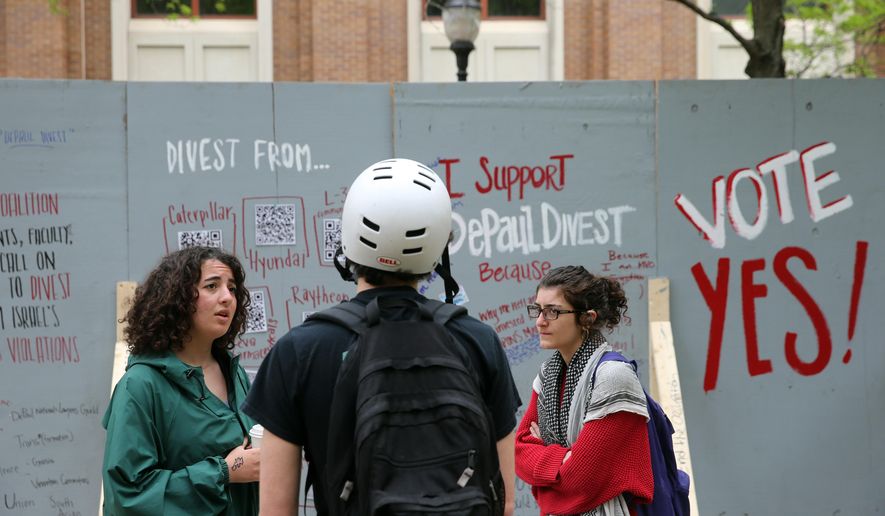OPINION:
College students the nation over have been embarking on an unsettling mission that involves boycotting all things Israel.
Wishful thinking would hope that at least some of this Boycott, Divestment and Sanctions (BDS) movement is based more on the failure of said college kids to be properly educated about Middle East affairs — more on the ignorance of the students — than on actual and outright hostility against the Jewish nation.
Neither scenario is good news. But at least the ignorance factor can be fixed.
The anti-Semitic factor is hard to overcome.
Here’s a sampling of what’s been taking place regarding BDS votes at America’s places of higher learning of late: Barnard College students passed a referendum demanding the Student Government Association pen a letter to the administration that demanded the campus divest from eight companies that “profit or engage in the State of Israel’s treatment of Palestinians.”
Members of the Student Association at George Washington University, meanwhile, passed a resolution by an 18-6 vote — cast anonymously, during a secret meeting — that called for the campus to divest from all-things-Israel, and accused the Jewish nation of being an apartheid state. The resolution also accused the university of violating international law by profiting from investments in Boeing, Lockheed-Martin and Caterpillar.
And that’s after a student-led referendum at the University of Minnesota calling for a divestment from Israel-tied companies passed, 3,392 to 3,175. That referendum, introduced by Students for Justice in Palestine, read in part: “Should the students of the University of Minnesota demand the Board of Regents divest from companies that are 1) Complicit in Israeli violations of Palestinian human rights, 2) Maintaining and establishing private prisons and immigrant detention centers, or 3) violating Indigenous sovereignty?”
It’s both notable and commendable that in all three of these cases, campus administrators stepped forward to put the halt to the BDS schemes — issuing stern denouncements about the divisive nature of the campaigns.
Minnesota’s campus president, Eric Kaler, for instance, said this: “[The BDS seems to conflate] opposition to the policies of the government of Israel and opposition to the existence of Israel.”
And that, really, is the whole problem with these BDS movements. No matter how they’re packaged, they’re not about exercising a free speech right by targeting an unfair business practice.
They’re about wiping Israel from the face of the map.
They’re about driving home the point that Palestinians are the rightful heirs to Israeli lands, and Jews should not only vacate — but die.
“What do Hezbollah, Islamic Jihad, Hamas and the Palestinian Front for the Liberation of Palestine (PFLP) have in common?” asked one writer for the Jerusalem Post in a 2017 analysis.
Now for the penned response: “These terrorist groups have all been lionized and glorified by Students for Justice in Palestine (SJP), the campus arm of the global boycott, divestment and sanctions (BDS) campaign.”
And coincidence of all coincidence — Not! — the SJP, which bills itself as an innocently grassroots-run group, is the common denominator for these U.S. campus-based BDS movements.
It’s anti-Semitism, pure and simple. It’s alarming and hate-filled. And it continues to sweep across America’s places of higher learning, landing soon at a university or college campus near you.
• Cheryl Chumley can be reached at cchumley@washingtontimes.com or on Twitter, @ckchumley.




Please read our comment policy before commenting.